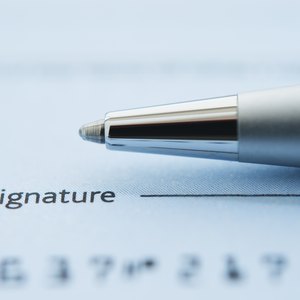
A checking account is a convenient way to pay bills, make purchases and receive deposits. The account holder must handle the account in a responsible manner, especially when it comes to checks. If someone deposited a bad check into your account, it's prudent to understand the potential consequences that may befall you and your account.
What Is a Bad Check?
If someone deposit's a check into your account with your permission, you are responsible for whatever happens with that check. A bad check is a check that bounces due to insufficient funds in the account the check is written on, or the check was written on a closed account. Bad checks are returned to your bank unpaid. Your bank will then charge you a fee for this returned item. This fee varies from bank to bank.
When Fraud is Suspected
If someone deposits a check into your account without your permission, you must inform your bank that you have been the victim of fraud, especially if you have unknowingly removed funds from the account based upon that check. The bank will place a freeze on the account to prevent any further transactions from posting to the account. The bank will also reverse or refund any fees you may have incurred as a result of the fraud and may require you to close that account and open a new one.
You may be required to press charges against the responsible party and swear under oath that you were not involved; otherwise, the bank may surmise that you are attempting to commit deposit fraud, which is withdrawing money from your account based upon a fraudulent check. Do not claim fraud if you were aware that the individual would deposit the check into the account. This may be considered perjury and you could find yourself in legal trouble.
Consequences of a Bad Check
If the deposited check was not the result of fraudulent activity, the bank will require you to pay any fees and overdraft charges that occur on your account as a result of the check. If the fees cause your account to have a negative balance, and you fail to pay it, the bank may close the account and report you to ChexSystems. ChexSystems is a financial credit bureau that maintains a database of consumers that have mishandled their bank accounts. It's used by banks when opening new accounts. An entry in ChexSystems will remain there for up to five years, and most financial institutions will refuse to open a new checking account if you are in the ChexSystems database.
Credit Implications
The bank may turn over any unpaid debt to a collection agency. The Fair Credit Reporting Act gives collection agencies the right to check your credit and place a collection account on your credit report. Collections are a negative item and can remain on your credit report for up to seven years. Thirty-five percent of your FICO credit score measures how well you pay your bills. A collection account indicates that you did not pay a debt and it may cause your FICO score to drop. How far it drops depends upon the other data on your report.
References
- Bankrate.com: ChexSystems
- myFICO: What's In Your FICO Score
- Chase: A Guide to Your Account
- Consumer Financial Protection Bureau. "What Is a Credit Score?" Accessed April 16, 2020.
- Consumer Financial Protection Bureau. "My Bank or Credit Union Closed My Checking Account. Will This Hurt My Credit?" Accessed April 16, 2020.
- Consumer Financial Protection Bureau. "What Are Specialty Consumer Reporting Agencies and What Kind of Information Do They Collect?" Accessed April 16, 2020.
- Consumer Financial Protection Bureau. "How Do I Get a Copy of My Credit Reports?" Accessed April 16, 2020.
- Consumer Financial Protection Bureau. "How Long Does Negative Information Stay on My Credit Report?" Accessed April 16, 2020.
- ChexSystems. "Frequently Asked Questions (FAQs)." Accessed April 16, 2020.
- Consumer Financial Protection Bureau. "Can I Close My Account Whenever I Want?" Accessed April 16, 2020.
Writer Bio
Mack Mitzsheva is a tax lawyer, personal finance expert and the author of the forthcoming ebook, "10 Best Places to Work Online." Mitzsheva is also a social media entrepreneur with five successful sites under her belt. Always innovative, Mitzsheva is currently developing a cutting-edge budgeting app for newlyweds.

